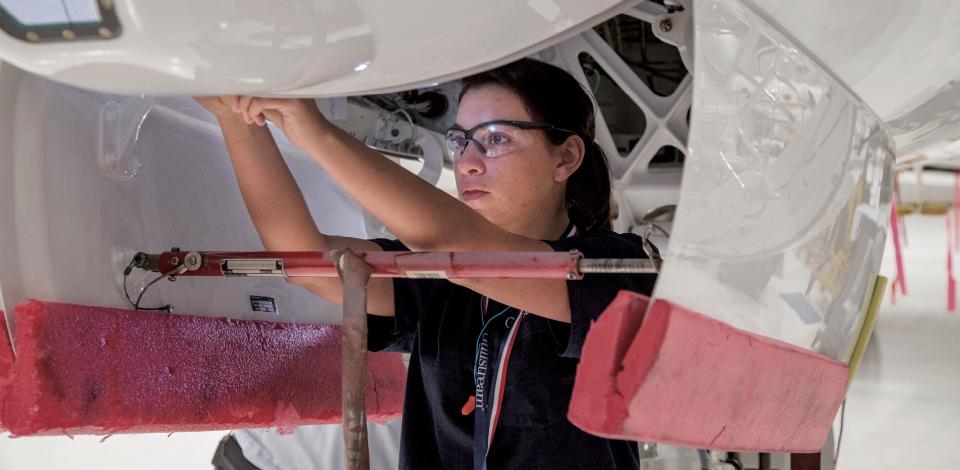The Value of Hiring a Military Veteran
Military transition program helps vets translate their competitive value in the civilian job market

Spc. Victoria Frizalone adjusts the latches of the nosecone of a G450 at the Service Center of Gulfstream Aerospace.
If you’re looking for reasons to hire a vet, it isn’t hard to find them. Service in the military demonstrates a level of commitment, comfort with responsibility, and work ethic that is difficult to match.
In a military setting, the result of poor judgement or an oversight can be catastrophic. For veterans, that awareness manifests as an unrivaled dedication to precision, focus, and follow through. That meticulous attention to detail coupled with a practiced capacity to rapidly absorb new information, results in a highly effective decision maker who is comfortable under pressure. Even more, a veteran’s understanding of goal orientation is tied with accountability to their team, where a successful mission is greater than the accomplishments of one.
While the unique blend of characteristics developed by Veteran's due to their training can position them to excel in the workplace, it’s key to remember that many have been conditioned to a setting that can operate quite differently than the civilian world – from the terminology, to the processes, and everything in between. That is why it is crucial to push beyond generalization and look at their value as individuals. When given the support needed to reframe their deep skill set in a way that can be translated more accurately, the potential is great.
Meet Wanda Perry, for example. Wanda currently serves as military services coordinator at WorkSource Coastal, a Savannah-based service organization that provides career development opportunities for adults and youth. In 2016, she retired after 20 years of service in the U.S. Army and Army National Guard. That’s also when she received her Lean Six Sigma Black Belt Certificate through Georgia Tech.
Lean Six Sigma is a managerial concept designed to improve performance and reduce waste. It is also a specific and highly sought-after skill in the private sector that is often easily relatable to veterans due to the heavily logistical nature of the military.
“Part of my job through outreach and networking is to ensure that my clients are aware of the services that WorkSource Coastal provides," explains Perry. "Lean Six Sigma has helped me to build upon the leadership and management skills that I learned on active duty.”
The certificate comes as part of the Veterans Education Training and Transition (VET²) program at Georgia Tech-Savannah. This fully-funded program equips veterans for civilian careers through a combination of classroom learning and/or online instruction as well as internship opportunities with employer partners. Lean Six Sigma is a key program offering that can help veterans position themselves in the civilian job market.
"The classroom component of VET² provides skill-set training in an industry-recognized certificate program," said James Wilburn, Ed.D., U.S. Army veteran and academic director of military programs at Georgia Tech-Savannah. "We match these service members with companies who are looking to hire based off of that training."
Charles Hudson, another graduate of the program, is currently working as a National Security Advisor with Booz Allen Hamilton. He tells a story similar to Perry’s: "The Lean Six Sigma Black Belt (LSSBB) certification through the VET² Program put me ahead of other job seekers. It’s helped with my studies at Harvard Business School. It helped me to look at things strategically and technically from a process standpoint."
The VET² program is one of the first of its kind in the nation. When it was founded in 2013, veteran unemployment in the state of Georgia was nearly double that of civilian unemployment. Since then, VET² has seen 1,500 graduates. Today, the veteran unemployment rate is at an all-time low of 4%, which means a more competitive market for businesses since fewer veterans and service members are available in the workforce to fill open positions.
For veterans and service members, this statistic describes both an opportunity and a challenge. The jobs are out there, but it is necessary to effectively articulate how the invaluable experience and skills they developed in the military align with positions available in the civilian workforce. That’s why successful students like Hudson and Perry value the professional certificates they received from VET².
Employers also recognize what an education from a world-renowned institution like Georgia Tech means, which makes certification a key bridge between military service and landing a civilian job.
“I knew that a Lean Six Sigma certification would help me stand out to potential employers," said Dylan Thomas, former captain in the U.S. Army and advanced management partner at Cintas. "Process improvement and using data to help improve function in our company has been a real asset to help me get to where I am today."
Learn more about Georgia Tech’s education for veterans programs at the Veterans Education Training and Transition (VET²) website.
Colin Strickland was a contributing author to this article.
Georgia Tech Professional Education is a leader in innovative educational delivery, designed for working professionals in tech, business, and leadership. Our connection to the marketplace — coupled with our world-class faculty, researchers, and subject matter experts — provides an unparalleled prospective to education innovation, industry trends, future work, and lifelong learning. To uncover additional resources to help with questions and challenges around career advancement visit our Working & Learning page.

